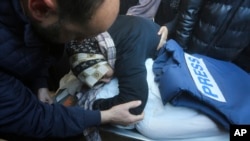Threats posed by governments and lawmakers are among the most concerning challenges for journalists around the world, Reporters Without Borders said in a report on Friday.
More governments and political authorities are failing to support and respect press freedom, the media watchdog, known as RSF, said as it released its annual World Press Freedom Index.
The rankings look at the political, legal, and economic factors affecting media, as well as the security situation for journalists in 180 countries and territories. Each is then assigned a score, where 1 shows the best environment.
The political sector saw the greatest deterioration of press freedom across all regions, RSF said.
“Political actors are more emboldened to denigrate the media, to vilify the press, to attack individual members of the press and journalists, to seek to weaponize the government apparatus against individual media outlets that are critical of them,” Clayton Weimers, the head of RSF’s U.S. office, told VOA.
That trend is all the more worrisome in a year where dozens of countries are set to hold national elections in 2024. Elections often feature violence against journalists and other curbs on press freedom, according to RSF.
World Elections 2024
Argentina experienced one of the biggest declines in media freedom compared to last year, Weimers said. It dropped from 40th place to 66th in the index.
The fall is due in large part to the election of President Javier Milei, “who has been openly hostile towards the media, has de-funded public media in Argentina and is leading the charge to vilify the press,” Weimers said.
Milei’s actions against the media underscores a broader phenomenon in which states and other political forces are playing a decreasing role in protecting press freedom, according to RSF.
Argentina’s Washington embassy did not immediately reply to VOA’s email requesting comment.
Norway maintained its status as the top country in the world for press freedom. Other countries in the top five include Denmark, Sweden, the Netherlands and Finland.
At the bottom of the list are Iran, North Korea, Afghanistan, Syria and Eritrea.
The United States dropped 10 spots to 55th as a result of journalist arrests and last year’s police raid on a newspaper in Kansas.
Last of the Watchdogs
Emily Wilkins, the president of the National Press Club in Washington, said it’s concerning to see press freedom under threat in the U.S. She pointed to harmful rhetoric from politicians as one specific worry.
“Politicians position themselves as being anti the press, calling the press enemies of the people,” Wilkins told VOA. “Every time that they villainize reporters and the media as a whole, that is a knock against democracy, and that is something that is making our entire country weaker.”
Russia’s two-point rise to a rank of 162nd is misleading. RSF says its global press freedom score actually got worse — but other countries fell even more.
“To be honest, 2023 didn’t see a lot of changes because the situation got so bad in 2022 that it can't get much worse,” Weimers said about Russia.
Factors contributing to that decline are Russia’s jailing of journalists, including two Americans.
The Wall Street Journal’s Evan Gershkovich has been jailed since March 2023 on espionage charges that he, his employer and the U.S. government deny. The State Department has also declared the 32-year-old wrongfully detained.
Alsu Kurmasheva, an editor at VOA’s sister outlet Radio Free Europe/Radio Liberty, has been jailed since October 2023 on charges of failing to self-register as a so-called “foreign agent” and spreading what Moscow views as false information about the Russian military. She and her employer reject the charges.
Press freedom groups have criticized the State Department for not declaring Kurmasheva wrongfully detained. The designation would open up additional resources to help secure her release.
“It’s very critical that the State Department go forward and declare her wrongfully detained. I think a lot of us in the journalism community are very concerned that that hasn’t already happened,” Wilkins said.
State Department officials are still deciding whether to declare Kurmasheva wrongfully detained, Roger Carstens, the U.S. special presidential envoy for hostage affairs, told reporters in April.
“The Department of State continuously reviews the circumstances surrounding the detentions of U.S. nationals overseas, including those in Russia, for indicators that they are wrongful,” a State Department spokesperson previously told VOA.
China, which is the worst jailer of journalists in the world, remained at the bottom of the index at 172nd.
“We’re very concerned that China is setting itself up as an export model for anti-democratic values that clamp down on press freedom and freedom of speech,” Weimers said.
But it’s not all bad news.
Improvements in Ukraine, for instance, mean the country rose 18 places to 61st, and in South America, Chile rose 31 places to 52nd.
Michael Lipin and Cristina Caicedo-Smit contributed to this report.





Forum